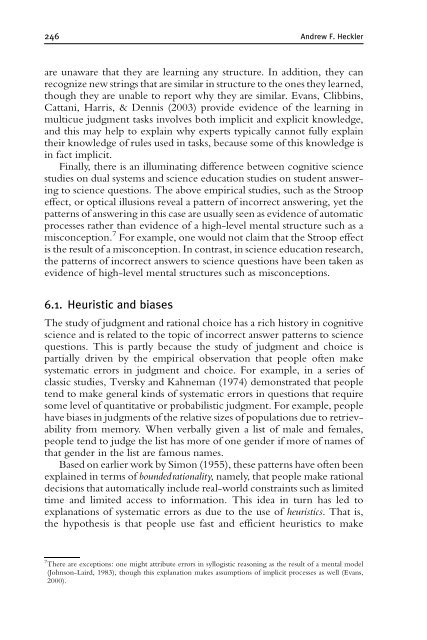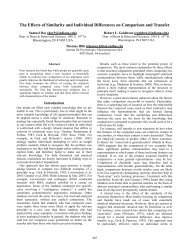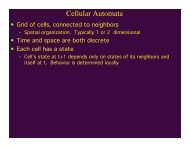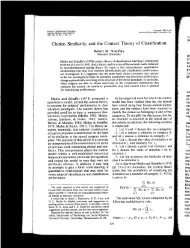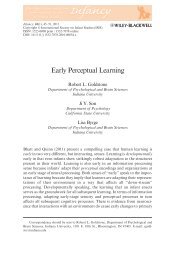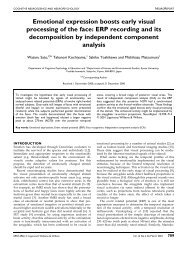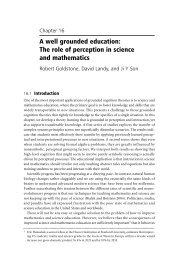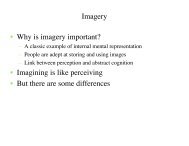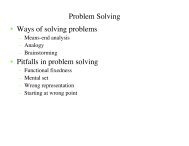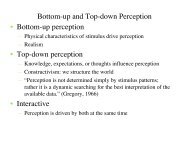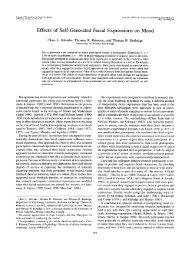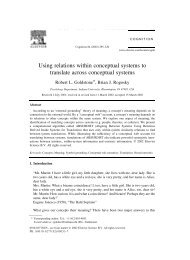the psychology of learning and motivation - Percepts and Concepts ...
the psychology of learning and motivation - Percepts and Concepts ...
the psychology of learning and motivation - Percepts and Concepts ...
You also want an ePaper? Increase the reach of your titles
YUMPU automatically turns print PDFs into web optimized ePapers that Google loves.
246 Andrew F. Hecklerare unaware that <strong>the</strong>y are <strong>learning</strong> any structure. In addition, <strong>the</strong>y canrecognize new strings that are similar in structure to <strong>the</strong> ones <strong>the</strong>y learned,though <strong>the</strong>y are unable to report why <strong>the</strong>y are similar. Evans, Clibbins,Cattani, Harris, & Dennis (2003) provide evidence <strong>of</strong> <strong>the</strong> <strong>learning</strong> inmulticue judgment tasks involves both implicit <strong>and</strong> explicit knowledge,<strong>and</strong> this may help to explain why experts typically cannot fully explain<strong>the</strong>ir knowledge <strong>of</strong> rules used in tasks, because some <strong>of</strong> this knowledge isin fact implicit.Finally, <strong>the</strong>re is an illuminating difference between cognitive sciencestudies on dual systems <strong>and</strong> science education studies on student answeringto science questions. The above empirical studies, such as <strong>the</strong> Stroopeffect, or optical illusions reveal a pattern <strong>of</strong> incorrect answering, yet <strong>the</strong>patterns <strong>of</strong> answering in this case are usually seen as evidence <strong>of</strong> automaticprocesses ra<strong>the</strong>r than evidence <strong>of</strong> a high-level mental structure such as amisconception. 7 For example, one would not claim that <strong>the</strong> Stroop effectis <strong>the</strong> result <strong>of</strong> a misconception. In contrast, in science education research,<strong>the</strong> patterns <strong>of</strong> incorrect answers to science questions have been taken asevidence <strong>of</strong> high-level mental structures such as misconceptions.6.1. Heuristic <strong>and</strong> biasesThe study <strong>of</strong> judgment <strong>and</strong> rational choice has a rich history in cognitivescience <strong>and</strong> is related to <strong>the</strong> topic <strong>of</strong> incorrect answer patterns to sciencequestions. This is partly because <strong>the</strong> study <strong>of</strong> judgment <strong>and</strong> choice ispartially driven by <strong>the</strong> empirical observation that people <strong>of</strong>ten makesystematic errors in judgment <strong>and</strong> choice. For example, in a series <strong>of</strong>classic studies, Tversky <strong>and</strong> Kahneman (1974) demonstrated that peopletend to make general kinds <strong>of</strong> systematic errors in questions that requiresome level <strong>of</strong> quantitative or probabilistic judgment. For example, peoplehave biases in judgments <strong>of</strong> <strong>the</strong> relative sizes <strong>of</strong> populations due to retrievabilityfrom memory. When verbally given a list <strong>of</strong> male <strong>and</strong> females,people tend to judge <strong>the</strong> list has more <strong>of</strong> one gender if more <strong>of</strong> names <strong>of</strong>that gender in <strong>the</strong> list are famous names.Based on earlier work by Simon (1955), <strong>the</strong>se patterns have <strong>of</strong>ten beenexplained in terms <strong>of</strong> boundedrationality, namely, that people make rationaldecisions that automatically include real-world constraints such as limitedtime <strong>and</strong> limited access to information. This idea in turn has led toexplanations <strong>of</strong> systematic errors as due to <strong>the</strong> use <strong>of</strong> heuristics. That is,<strong>the</strong> hypo<strong>the</strong>sis is that people use fast <strong>and</strong> efficient heuristics to make7 There are exceptions: one might attribute errors in syllogistic reasoning as <strong>the</strong> result <strong>of</strong> a mental model(Johnson-Laird, 1983), though this explanation makes assumptions <strong>of</strong> implicit processes as well (Evans,2000).


